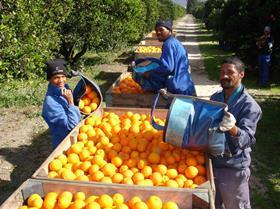
The South African citrus fraternity will return to their offices after the holidays next week, still none the wiser a to whether they will be able to export their fruit from Citrus Black Spot (CBS) proclaimed areas in the country to the European Union this year.
An ongoing study by the European Food Safety Authority (EFSA) on the risk that CBS poses European citrus producers is now only expected to be completed at the end of January, less than a month before the new season starts.
The European Commission imposed a temporary ban on South African citrus from areas where CBS is prevalent at the end of last season, but warned at the time that the ban could be extended to 2014.
Key to the future will be whether the EFSA report finds that CBS, which is harmless to humans, does have the potentialto establish itself in Europe's estimated 500,000ha of citrus groves.
Shortly before Christmas a high-powered South African citrus delegation, led by Citrus Growers’ Association (CGA) chairperson Pieter Nortje, travelled to Europe to wrap up the season and to hold meetings with Dutch and German importers, the EU authorities, European grower representatives and other interested parties. On its return, CGA spokesman Justin Chadwick said the importance of South African citrus trade in Europe is widely recognised and supported.
“We need to comply to keep this market open in 2014,” said Chadwick, who emphasised that everything will have to be done to ensure compliance – including sacrifices. “If (product) is in doubt, then (it should) stay out.'
Chadwick says the uncertainty will unfortunately prevail until after the EFSA report is complete at the end January. “At best we can plan for the same scenario as 2013,' he laments.
In order to prevent exceeding the limit of interceptions during the South African season last year, the industry and the government introduced a complex system of additional checks and balances before fruit destined to Europe could be loaded at South African ports. This resulted in bottlenecks and congestion which made the season a nightmare for logistics operators.
“Communication is key,” continues Chadwick. “We must immediately communicate about the 2013 season and what is planned for 2014. And then we need to continuously engage (with the EU) throughout 2014. The CGA is in the process of engaging additional resources to ensure continual communication.”
While the South African industry has so far been fixed on the argument that CBS does not pose any risk to European citrus producers, and has presented much evidence to back their point of view, there are some people in the South African industry questioning the current strategy.
“It does not always help to be confrontational and nobody, especially the EU and the citrus states, wants to hear that they do not know what they are talking about,” says a spokesman for a large exporter. “South Africa needs to make deals which could mean that South Africa will withdraw from certain sensitive areas in Europe.”
Well-known Western Cape citrus grower and marketer Gerrit van der Merwe, previously stated that one simply has to comply with the requirements and protocols of importing countries.
“We learnt these lessons in the United States where we have carved for ourselves a very important market despite tough compliance issues. You simply have to do so to be able to trade in certain countries,' he adds.
An EU decision sometime in February will leave very little time for South African growers and exporters to make alternative plans. In any event, the EU absorbs such a large portion of the South African crop that it will be impossible to completely shift the fruit somewhere else.



